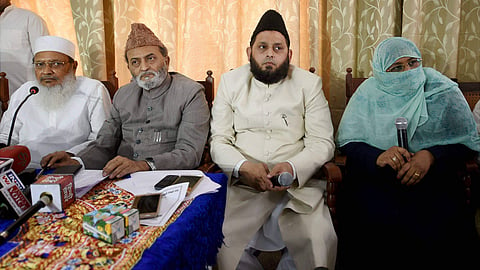

LUCKNOW: Facing uproar over the issue of triple talaq, the All India Muslim Personal Law Board (AIMPLB) on Sunday brought out an eight-point code of conduct for minority community while pronouncing talaq.
In a deterring measure against the 'misuse the provisions of triple talaq', the Board decided to ostracise those who do it in one sitting. The committee sought social boycott of those choosing ‘such an improper way of triple talaq’ to dissolve the marriage.
Refusing to accept any outside interference to curb the practice of triple talaq, the Board maintained that it was its “constitutional” right to get the Muslim personal law implemented. However, in a shift from its earlier stand when it was not ready to listen to anything on triple talaq, the Board did agree that doing it in one go was unfair and improper.
The right way to annul a marriage, says the Board's new code of conduct, is to do it in three sittings with a gap of at least a month between two sittings as once pronounced, the practice led to annulment of ‘Nikaah’ (marriage).
The AIMPLB, which is an umbrella organisation of various Muslim bodies in India and is considered a representative of the community, appealed to all Muslim clerics, particularly, the Imams who lead Friday prayers in mosques, to educate
the Muslim men about the demerits of triple talaq and its implications in the society. “They should be dissuaded from indulging in practice which is not the correct way of reaching a divorce,” resolved the AIMPLB working committee.
Coming out strongly in support of triple talaq till recently, the Board has been calling it an internal issue of community and that any outside interference would be deemed as an infringement in the religious rights of the community guaranteed by the Constitution of India.
Moreover, a number of Muslim women, victim of the practice, have approached courts and dispensation both at the Centre and State seeking institutional intervention to put a leash on triple talaq as they feel it against the fundamental right to gender equality and a life to be lived with pride and dignity.
The Constitutional Bench of Supreme Court is set to start the hearing in triple talaq related petitions from May 11. It may be recalled that Centre has already made the submission of its stand in the court through an affidavit in October last year while AIMPLB had been harping over the point that it would accept no judicial ruling over the issue.
The Board feels that if the judicial order would be accepted in triple talaq issue, it would pave the way for the courts to spell out ruling in other issues also of the minority community which is regulated by the Muslim Personal Laws (Shariya) in the country. They also fear that in large run it may result in promulgation of Uniform Civil Code (UCC) in the country.
In fact, AIMPLB came into being over four decades ago to counter any move to have UCC in the country.
However, the AIMPLB sought to downplay the agony of the Muslim women who become victim of triple talaq. Board general secretary Maulana Wali Rehmani expressed dismay over the alleged perception, which according to him, was being created in the society that triple talaq was the commonest way of divorce among Muslims. “It is a false propaganda. The divorce rate among Muslims is just 0.5 per cent which is negligible as compared to the corresponding figures of other communities in India,” Rehmani said while talking to media after the conclusion of two-day working committee meeting of the Board. Meanwhile he sought to justify talaq over phone or social media on the plea that if wedding invitation and other information can be conveyed through social media then why should talaq be an exception.
The other major outcome of the working committee meeting which was presided over AIMPLB chairman by Rabey Hasan Nadvi – the rector of Nadwa-um-Islam – was in context with Temple issue. The Board, in fact, decided not to go for an out of court, mutually negotiated settlement of the issue by the stakeholders in accordance to the Supreme Court’s suggestion. “All the prior efforts in this direction have proved futile,” said AIMPLB working committee adding that the community would accept the SC decision and decided to press for an early disposal of the case.